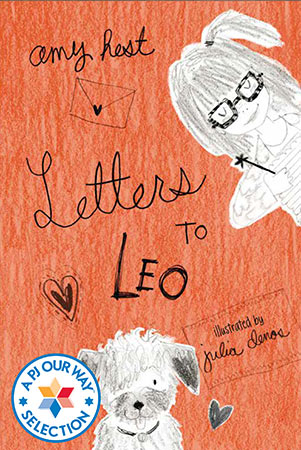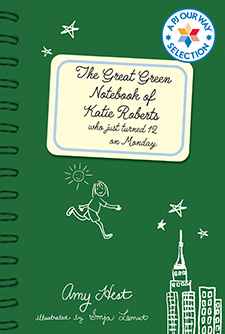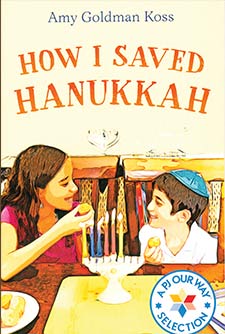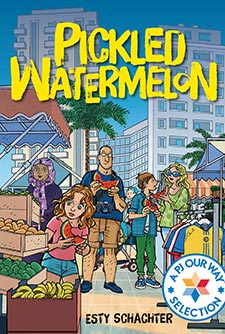Letters to Leo
Fourth grader Annie Rossi’s got lots of great ideas: how to be a Model Citizen, how to be a (fake) Yankees fan, and how to teach her professor dad how to race on a bicycle! Her four-legged best friend, Leo, completely agrees.
Average Rating
( hint: Login to leave a review! )
126 Reviews
Leave Review
What the Book is About
Jewish Content & Values
Positive Role Models
Content Advisory
Talk it Over!
More for You
What the Book is About
10-year-old Annie Rossi is having a tough year in fourth grade. Her mother has passed away, her father isn’t too happy about their new puppy, her new teacher is very serious, her best friend is moving to New Jersey, and she keeps getting paired with annoying Edward for school projects. But Annie also discovers a love of writing and poetry and a stronger connection with her father. In a series of poignant, illustrated letters to her puppy Leo, Annie works through challenges both large and small and ends up having a great year.
Jewish Content & Values
- Annie reminisces about the time her mother made challah.
- Annie helps her father make latkes for the first night of Hanukkah.
- Annie and her father go to synagogue on Friday night.
Positive Role Models
- Annie is a sweet, insightful child who takes good care of her dog, helps her friends (even when it’s hard!), and encourages her father to exercise and try new things.
- Annie’s father, a professor, agrees to get Annie a puppy and takes her to a Yankees game. He observes Jewish traditions and holidays with Annie, gets on a bike again for the first time in years at Annie’s request, and has thoughtful conversations with her about challenges with her school friends.
- Miss Meadows and Mrs. Bailey, Annie’s third and fourth grade teachers, are supportive and encourage Annie’s interest in writing and poetry.
Content Advisory
Annie’s mother has passed away before the book starts, and Annie misses and remembers her throughout the book. There are no further details about death or dying, so this should not be upsetting to most readers.
Talk it Over!
- When annoying Edward felt sick in class, Annie’s teacher asked her to walk him to the nurse. Annie didn’t want to go; she wanted to stay and compete in the class spelling bee. But she went anyway and pretended to be happy about it. The next day, Annie was named the “Model Citizen” of the week. She felt like a fake because she didn’t feel happy as she took Edward to the nurse. Does it matter how we feel about helping a friend or performing a mitzvah? Do we need to be happy about it, or is it good enough just to do it?
More for You
Tza’ar ba’alei chayim is a Talmudic prohibition against causing unnecessary cruelty to animals. Although, according to Jewish law, we are permitted to eat meat and utilize animals for work and transportation, Jewish guidelines regarding kashrut (kosher) and the treatment of beasts of burden, pets, and animals we meet in nature demand that we minimize their suffering whenever possible. Spending time with animals, whether it’s taking care of a pet or volunteering at an animal shelter, is an effective way for children to learn the basic principles of avoiding tza’ar ba’alei chayim, as well as compassion, empathy, responsibility, respect, loyalty, and patience.
What the Book is About
What the Book is About
10-year-old Annie Rossi is having a tough year in fourth grade. Her mother has passed away, her father isn’t too happy about their new puppy, her new teacher is very serious, her best friend is moving to New Jersey, and she keeps getting paired with annoying Edward for school projects. But Annie also discovers a love of writing and poetry and a stronger connection with her father. In a series of poignant, illustrated letters to her puppy Leo, Annie works through challenges both large and small and ends up having a great year.
Jewish Content & Values
Jewish Content & Values
- Annie reminisces about the time her mother made challah.
- Annie helps her father make latkes for the first night of Hanukkah.
- Annie and her father go to synagogue on Friday night.
Positive Role Models
Positive Role Models
- Annie is a sweet, insightful child who takes good care of her dog, helps her friends (even when it’s hard!), and encourages her father to exercise and try new things.
- Annie’s father, a professor, agrees to get Annie a puppy and takes her to a Yankees game. He observes Jewish traditions and holidays with Annie, gets on a bike again for the first time in years at Annie’s request, and has thoughtful conversations with her about challenges with her school friends.
- Miss Meadows and Mrs. Bailey, Annie’s third and fourth grade teachers, are supportive and encourage Annie’s interest in writing and poetry.
Content Advisory
Content Advisory
Annie’s mother has passed away before the book starts, and Annie misses and remembers her throughout the book. There are no further details about death or dying, so this should not be upsetting to most readers.
Talk it Over!
Talk it Over!
- When annoying Edward felt sick in class, Annie’s teacher asked her to walk him to the nurse. Annie didn’t want to go; she wanted to stay and compete in the class spelling bee. But she went anyway and pretended to be happy about it. The next day, Annie was named the “Model Citizen” of the week. She felt like a fake because she didn’t feel happy as she took Edward to the nurse. Does it matter how we feel about helping a friend or performing a mitzvah? Do we need to be happy about it, or is it good enough just to do it?
More for You
More for You
Tza’ar ba’alei chayim is a Talmudic prohibition against causing unnecessary cruelty to animals. Although, according to Jewish law, we are permitted to eat meat and utilize animals for work and transportation, Jewish guidelines regarding kashrut (kosher) and the treatment of beasts of burden, pets, and animals we meet in nature demand that we minimize their suffering whenever possible. Spending time with animals, whether it’s taking care of a pet or volunteering at an animal shelter, is an effective way for children to learn the basic principles of avoiding tza’ar ba’alei chayim, as well as compassion, empathy, responsibility, respect, loyalty, and patience.




